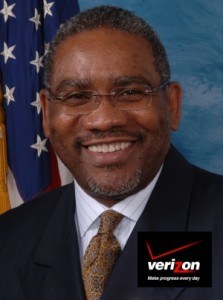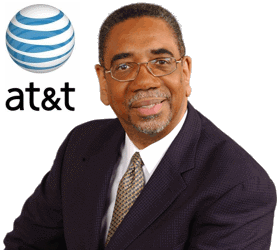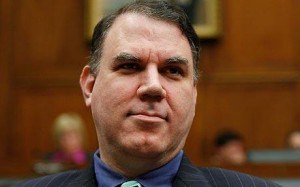
NNPA has direct and long-standing ties to AT&T
Sometimes it’s hard to tell real journalism from industry-backed “dollar-a-holler” hackery, but the National Newspaper Publishers Association, an organization of Black newspaper publishers, went way over the top and made it too easy.
Their “special correspondent” Yaounde Olu wrote a particularly nutty piece of paranoia in an article titled, “Free Press Targets Poor Blacks and Women for Net Neutrality Campaign,” attacking pro-consumer group Free Press for daring to work with the Harmony Institute to undo industry propaganda, astroturf group nonsense, and multi-million dollar corporate lobbying efforts to derail broadband reforms like Net Neutrality.
If this is what passes for “news,” newspapers should reconsider their NNPA membership unless they throw in some free iPhones from AT&T:
In a bid to ensure Net Neutrality, the Free Press has commissioned the Harmony Institute to develop a strategy that will target poor, rural African- Americans in the South and women to increase support for a Net Neutrality (NN) strategy. Net Neutrality is basically the principle that all Internet traffic should be treated equally. In other words, everyone has access, and all platforms, content, and sites are treated equally. The opposite concept is a system wherein there would be limited or possibly “tiered” access. This could impact small businesses and other individuals without the economic wherewithal to access all sites.
According to the Free Press, the core supporters of Net Neutrality are affluent whites, who, have easy access to broadband and understand the issues. Poor, rural African-Americans and women, however, are the demographic that must be influenced in order to build a secure NN support base.
The Harmony Institute, a self-identified nonprofit organization committed to applying behavioral science to communications, in response to the Free Press’ commission, has produced a manual for the purpose of achieving these ends entitled Net Neutrality For the Win: How Entertainment and the Science of Influence Can Save Your Internet. This 40-page document identifies poor, rural African Americans and woman as “persuadable” for Net Neutrality messaging, and lays out very specific strategies for accomplishing their end goal of manipulating this demographic.
[…]Prominent members of the African American community have expressed serious concerns about the strategy laid out in the Free Press document. Shirley Franklin, a former mayor of Atlanta, offered the following observation, “It troubles me that an organization would target women, African-Americans and other minorities on an issue of such importance as universal broadband services without basing their advocacy on access, affordability and relevance.”
Julius Hollis, Chairman and founder of the Alliance for Digital Equality (www.alliancefordigitalequality.org), an organization whose mission is to ensure accessible and affordable broadband to the unders erved and un-served, particularly to communities of color, also weighed in on the issue. He stated, “I am extremely disappointed in the Free Press, not only in its policies and tactics that they are attempting deploy in their strategy paper, but equally disturbing are its attempts to portray the African-American and Latino consumers as expendable in their efforts to promote Net Neutrality. In my opinion, this is going back to the tactics that were used in the Jim Crow era by segregationists. It’s no better than what was used in the Willie Horton playbook by Lee Atwater who, upon his deathbed, asked for forgiveness for using such political behavior tactics.”
[…]Danny J. Bakewell, Sr., Chairman of the National Newspaper Publishers Association (NNPA), is taking the lead on fighting the Free Press’s NN strategy. He has this to say about it, “… I am outraged. And you should be too. I urge you to get out in your community and tell your friends, tell your neighbors, and tell those you meet at church and other groups about this appalling report. Most importantly, call and email Free Press and tell them you need a broadband connection to your house, not a subliminal message beamed into your subconscious.”

The Alliance for Digital Equality is directly backed by... AT&T
The NNPA and this “reporter” failed Journalism:101. Let us count the ways:
For NNPA’s reporter, Balance is a nutrition bar, not an objective to strive for in this thinly-disguised hit piece against Free Press. Last time I checked, Free Press was happy to answer their critics and share their own views on the subjects that concern the telecommunications industry and their specially-funded-friends. Olu couldn’t find the space for the other side after all those “shame on you Free Press” quotes.
The portrayal of issue positioning and strategic messaging to reach various groups with a pro-Net Neutrality message is hardly an insidious, offensive plot. In fact, unlike big telecom companies, the pro-Net Neutrality side has released their findings in public. While the telecom industry marks their astroturfing and corporate lobbying strategies “top secret,” the pro-Net Neutrality side has nothing to hide.
But what would a newspaper association catering to African-American newspapers be doing in the middle of this fight in the first place? As Stop the Cap! has seen and reported countless times before, when interest groups suddenly take an interest in supporting the telecom industry’s agenda items, telecom money is usually not far behind.
The most shameful part of the original article is the “reporter” couldn’t be bothered to be honest with readers and disclose the fact NNPA, the organization behind the article, has direct close ties to AT&T. So do all of the quoted sources in the article. The lack of disclosure is inexcusable, shoddy journalism — ultimately producing just one more piece of industry propaganda.
“NNPA and AT&T Are Partners”
AT&T’s North Carolina President Cynthia Marshall was NNPA’s special guest at a corporate luncheon held by the group this past February, during their Winter Conference held in Charlotte, N.C.
Pharoh Martin, NNPA National Correspondent, covered the event and noted AT&T had “recently established a partnership with NNPA and the NNPA Foundation.” Martin noted AT&T’s interest in broadband issues and reform are a top agenda item for the telecommunications company and the company ran an Internet Cafe during the event, exposing visitors to AT&T’s agenda.
The Center for Media and Democracy’s SourceWatch also notes NNPA has maintained strong ties with AT&T.
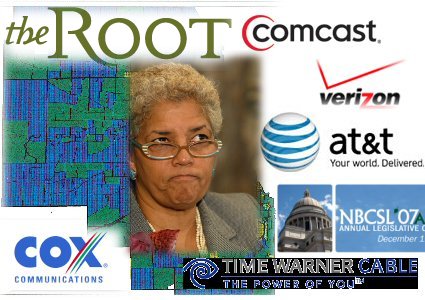
Shirley Franklin provides "dollar-a-holler" support for big cable and phone companies. (Black Agenda Report produced this montage image)
Shirley Franklin, quoted in the piece, was called a prostitute for AT&T by the Black Agenda Report. After her stint as Atlanta mayor, she’s been an enthusiastic “dollar-a-holler” supporter for big cable and phone company interests.
Julius Hollis, chairman and founder of the Alliance for Digital Equality might be deeply disappointed with Free Press in his word salad of hyped outrage, but consumers should be even more upset that Hollis, too, is working for AT&T’s interests. In fact his group is directly supported by AT&T. Actually, calling the ADE a “group” might be a stretch.
As SourceWatch noted, “According to its 2007 tax return (Form 990), it had an operating budget of over $2 million, of which no money was allocated for fundraising, nor hiring of employees. In fact, the total compensation for board members exceeded the amount of all program-related expenses.” That means loads of largesse for Hollis and the aforementioned Ms. Franklin, who “seems to be some sort of senior advisor to ADE,” according to the Black Agenda Report.
Mr. Bakewell’s admission that he’s taken a political position in this debate makes the NNPA just another player in the political arena. They cannot call themselves impartial in this debate, nor should they be writing ostensibly unbiased news reports while also cheerleading AT&T and proclaiming a partnership with the phone giant.
Bakewell’s half-baked notions that AT&T will suddenly provide affordable broadband to most Americans while it continues to raise prices on broadband service (and in some cases limit its use), would simply be dismissed as naive if AT&T’s money wasn’t helping to feed the rhetoric.
The subliminal message beamed into the subconsciousness of NNPA’s readers is the one carefully crafted by AT&T to generate fake outrage and turn a telecommunications debate into another piece of raw meat for racial politics. Once the puppet strings leading back to AT&T are revealed to readers, the real outrage should be reserved for the NNPA itself, cynically doing the bidding of a phone company and manipulating readers with false scandals and pointless side shows of distraction.
Obtaining universal access to affordable, high quality broadband service is not, nor has it ever been, a racial issue. It’s an economic issue that has been exacerbated by companies that enjoy their current duopoly status and can afford to keep raising the prices on their customers, regardless of who they are.
Stop the Cap! is a pro-consumer group with no industry ties and no corporate money to hide. We’re 100 percent consumer backed and consumer supported. Too bad the NNPA, Ms. Franklin, Mr. Hollis and Mr. Bakewell cannot say that.
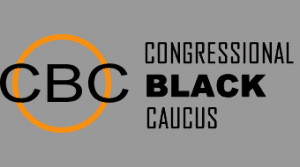 Color of Change needs everyone to take a moment and let members of the Congressional Black Caucus know we need them to stand up for Net Neutrality and broadband reform to help Black communities harness the political, economic, educational, and cultural power of the Internet.
Color of Change needs everyone to take a moment and let members of the Congressional Black Caucus know we need them to stand up for Net Neutrality and broadband reform to help Black communities harness the political, economic, educational, and cultural power of the Internet.

 Subscribe
Subscribe